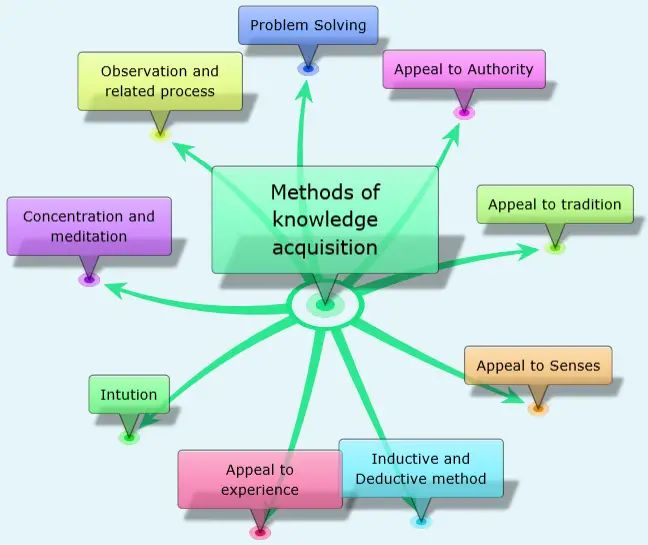The acquisition of knowledge is a central tenet in the Bahá’í Faith, which espouses a progressive understanding of truth and the nurturing of personal and collective enlightenment. Within this spiritual framework, Bahá’ís recognize four principal methods by which individuals may acquire knowledge. These methods are not merely theoretical constructs; they serve as guiding principles for a meaningful and purposeful life. Each method offers a distinctive approach to learning, facilitating both personal growth and the betterment of society.
1. The Use of Reason
The first method is the use of reason, a faculty that distinguishes humanity and allows individuals to analyze, synthesize, and critically evaluate information. In the pursuit of knowledge, reason acts as the cornerstone of understanding, encouraging individuals to engage dynamically with their environment and the complexities of existence. Bahá’u’lláh, the founder of the Bahá’í Faith, emphasizes the importance of reason as an instrument of discernment. He advocates for rigorous inquiry, urging adherents not to accept principles blindly but to examine them critically, weighing evidence and drawing conclusions based on logic.
This method invites a shift away from dogmatic adherence to tradition toward a more analytical approach. The ability to question, hypothesize, and reason fosters a culture of intellectual freedom. Individuals are encouraged to explore metaphysical questions and universal truths through analytical thinking, promoting a deeper understanding of both material and spiritual reality.
2. The Examination of the Natural World
The second method involves the examination of the natural world. The Bahá’í teachings celebrate the beauty and complexity of the universe as a reflection of divine wisdom. An exploration of nature provides a profound source of knowledge, as it showcases the interconnectedness of all things. By observing natural phenomena, individuals can discern patterns, principles, and laws that govern existence.
Scientific inquiry, thus, holds an esteemed place in the Bahá’í perspective. It emphasizes that the study of nature doesn’t contradict spiritual understanding but rather complements it. This method calls for a harmonious relationship between science and religion, championing the concept that they serve as twin pillars for the advancement of civilization. When individuals investigate the physical world through the lens of scientific methodologies, they can uncover truths that enlighten both their empirical understanding and their spiritual consciousness.
3. The Reports of Others
The third method is the reliance on the reports of others—essentially, the learning that occurs through interpersonal connections. Knowledge is often shared through dialogue, teaching, and mentorship. The Bahá’í Faith encourages individuals to gain insights from the experiences and observations of others, valuing the wisdom that can be gleaned from communal narratives.
This method underscores the significance of consultation, a fundamental practice within the Bahá’í community. By engaging in thoughtful discussions, individuals can collaboratively explore diverse perspectives that may challenge their own preconceptions. The rich tapestry of human experiences offers a reservoir of knowledge that can illuminate one’s understanding of moral, social, and spiritual realities.
Moreover, the importance of history as a form of knowledge acquisition is emphasized. Understanding the lessons learned from past endeavors, both successful and unsuccessful, can provide valuable context for current circumstances, thus aiding in the navigation of contemporary challenges.
4. The Felt Experience
The fourth method is the felt experience. This realm of knowledge transcends intellectual comprehension, tapping into the deeper emotional and spiritual aspects of the human condition. Felt experience encompasses the intuitive knowledge that arises from personal reflection, meditation, and direct emotional engagement with life situations.
In the Bahá’í teachings, the importance of prayer, meditation, and inner contemplation is highlighted as a means to cultivate personal insight and divine connection. These experiences cultivate a form of knowledge that is intrinsic and personal, often leading to profound revelations. Personal trials and triumphs can act as catalysts for growth, guiding individuals toward a deeper understanding of their purpose within the universe.
The integration of felt experience into the wider methods of knowledge acquisition enhances the fabric of spiritual development. It instills empathy, compassion, and a sense of responsibility toward others, fostering communal harmony and social justice.
Conclusion
Each of the four methods of acquiring knowledge—reason, examination of the natural world, the reports of others, and felt experience—provides a unique lens through which individuals may seek truth. Collectively, they engender a holistic approach to understanding, promoting not only personal growth but also the upliftment of society as a whole. The Bahá’í Faith articulates the idea that the pursuit of knowledge is a lifelong journey, one that requires dedication, humility, and a continuous quest for understanding.
In a rapidly changing world, these methods serve as timeless guides, inviting individuals to engage meaningfully with the universe, fostering an environment where ideas flourish, and facilitating the emergence of a more just, understanding, and peaceful world. Ultimately, the act of acquiring knowledge becomes a divine vocation, inspiring individuals to embody the principles of unity and service that lie at the heart of the Bahá’í teachings.
